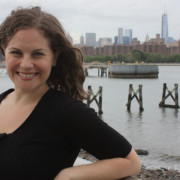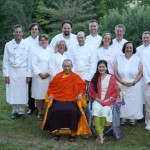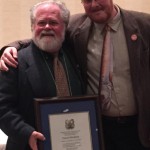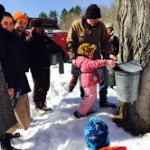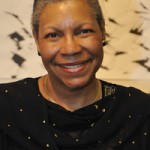Thursday
Buddhism, Psychedelic-Assisted Therapy and the Spiritual Path: An Interview with Dr. Sara Lewis
by Jillian Johnson
Register for the Buddhism, Psychedelic-Assisted Therapy and the Spiritual Path One-Day Retreat
One of the five main precepts in Buddhism is to avoid intoxicants, and it is clear that the use of substances can lead to spiritual bypassing. Yet many renowned practitioners in the West have talked openly about psychedelics as a catalyst to spiritual awakening that led them to the Dharma. Today, we sit down with Dr. Sara Lewis, co-founder of the Memoru Center for Visionary Healing Arts in Boulder, Colorado, and the Center for Psychedelic Studies at Naropa University, where she also served as an associate professor, and author of Spacious Minds: Trauma and Resilience in Tibetan Buddhism, to discuss the use of psychedelics in therapy and along one’s spiritual journey. In this interview, Sara provides us with her personal and professional perspective while considering how such practices may intersect, or not, with the Buddhist path.
Dr. Sara Lewis will hold an online mini-retreat, Buddhism, Psychedelic-Assisted Therapy and the Spiritual Path, through Shambhala Online on July 20, 2025. Click here to learn more and to register.
Jillian: Hi Dr. Lewis, thank you so much for being here with us today to share more about your work and knowledge in the field of psychotherapy and the implementation of psychedelics in mental health settings and spiritual pursuits.
Would you please tell us a little bit about your ‘why’ behind your work in mental health and how it expanded into the area of psychedelic-assisted therapy?
Dr. Lewis: I have long been interested in the mind: concepts of mind, the beauty and the challenges of the mind, and what it means to be human. As an anthropologist of religion and a psychotherapist, I am also deeply interested in how our connection to the divine changes across culture. In one way or another, I have been involved in the field of psychedelic studies for the last twenty years, yet it is more recent that psychedelic therapy has become more mainstream. As a Buddhist, I continue to see my clinical work as a skillful means to work with suffering in the world.
Jillian: How fascinating. We heard you opened a new clinic? Congratulations and please tell us more!
Dr. Lewis: Yes! Memoru Center for Visionary Healing Arts is a contemplative-based psychedelic training institute and community clinic where we offer legal psychedelic therapy. We can accept out of state clients who wish to travel to Colorado for a psilocybin experience. The Memoru clinic has a strong connection to Naropa University, where most of the cofounders have either worked as faculty or completed their studies.
Jillian: That’s very exciting, congratulations again! Speaking of legal psychedelic therapy, what do you feel are the current social and political climates surrounding the utilization of substances (primarily psilocybin and MDMA) in controlled mental health and spiritual settings? Are you noticing more or less acceptance in your typical day-to-day professional and personal interactions than in recent years?
Dr. Lewis: In general, there is a lot of interest and excitement for the therapeutic use of psychedelics. Many people understand that among veterans, abuse survivors, and others with PTSD, our standard treatments often fall short. As well, there is deep potential for plant medicines and psychedelics for those navigating the end of life. At Memoru, we will have a family program that aims to work with entire families–this might be when one person is at the end-of-life, navigating the post-partum period after birth, couples work, or a veteran returning home. When psychedelic care is done in a way that is slow, intentional and safe, I think there is significant support. At the same time, our basic health care infrastructure is not really set up to easily make this type of work accessible. Psychedelics do not fit easily into a capitalist system and without sounding too conspiratorial, the global Big Pharma system has many reasons to hinder the kind of paradigm shift many of us interested in psychedelic-assisted therapy are hoping for. Still, I believe that most of us yearn for change. With psilocybin now legal in various capacities in Oregon, Colorado and most recently, New Mexico, I believe in the next 5-10 years we will see a significant shift in accessibility of these modalities in North America and around the globe.
Jillian: Thank you so much for this thoughtful response, Sara. It is comforting to know that all areas of support are being explored for those seeking treatment and their families. Do you feel momentum and public support will eventually result in the integration of psychedelics into mainstream healthcare?
Dr. Lewis: Absolutely. And this could go the other direction as well if we do not take seriously the ethical responsibility to work with these medicines in a safe way. Many cultures across the world understand plant medicines to be living beings with sentience. They shouldn’t be “taken” in an extractive way. If we can relate with the cultures ethically who are stewards of these medicines, and collaborate and learn from them, I think we may have good results. For society as a whole to open up to them, I think we are in a critical period of needing to demonstrate that as a human society we can be trusted with these powerful agents. It’s up to us! But I feel the plants and fungi also want to help.
Jillian: I love your statement “…I feel the pants and fungi also want to help” and the care you show towards our Plantae and Fungi kingdoms. Have you noticed an increase in the number of patients and clients willing to consider psychedelics as part of their treatment plan for depression, anxiety, addiction, PTSD, etc.?
Dr. Lewis: Yes, very much so. Many people have earnestly tried conventional therapies without much relief. There are also many people seeking to work with suffering within the human condition in a way that honors and deepens their spiritual path. So there’s sort of a question about whether the work is “mental health work,” “spiritual work,” or something else. There is also a lot of joy, beauty and connection, something that may not be fully honored in a traditional treatment plan that tends to focus rather narrowly on the eradication of symptoms.
Jillian: It sounds like a very integrative approach that is catered to each individual’s unique needs and requirements, which is still lacking in many areas of healthcare. Would you tell us more about a situation(s) where the assistance of psychedelics, in a therapeutic application, aided a client in a breakthrough (mental, emotional and/or spiritual) that may not have occurred, or may have taken longer to occur, with more traditional mental health practices? Are you able to expand on the experience, at least from your perspective, and how that felt?
Dr. Lewis: I have had so many clients with intergenerational and ancestral experiences, even when they weren’t necessarily seeking that out. This has looked like deeply experiencing and seeing the ways that an ancestral burden has been passed down through the ages, visitations from elders who have passed, and sometimes a deep experience of connection and homecoming into one’s ancestral lineage. This happens so frequently that I myself, have embarked on a formal process of Ancestral Lineage Healing over the past year to better learn to work with my own spiritual lines. We will have more on this in the mini-retreat!
Jillian: This sounds not only incredibly interesting, but heart-warming as well. What a beautiful experience for both you and your clients. I am intrigued to hear more at the mini-retreat! In which situation(s) do you recommend someone not take psychedelics or partake in psychedelic-assisted therapy if it is a path they are interested in pursuing for their mental health and/or spiritual journey?
Dr. Lewis: These agents can be very powerful and it’s important to know if it’s the right time. I receive many referrals for people who have had negative even traumatic experiences resulting from psychedelics. Beyond contraindicated conditions like psychosis and mania (though even those who have these histories may be able to work in psychedelics under certain conditions), I wouldn’t recommend jumping into working with them if things aren’t stable enough to be able to accommodate potentially big and sometimes disruptive shifts. Sometimes these medicines work through disruption and dissolving: this could be to harmful patterns, misperceptions, ego-clinging, itself, or even the dissolving of relationships, career or other major disruptions.
Jillian: This is a very strong point to consider. Thank you for mentioning ‘being ready’ for shifts. While it is often said “The only constant change,” it is important to remember to be as grounded as possible before inviting a powerful catalyst for said change. What would you recommend as some of the “should” and “should nots” before holding a psychedelic session in terms of choosing an appropriate environment, monitoring one’s current mental state, integrating other practitioners and/or professionals, etc.? In a sense, what would you recommend in terms of setting yourself up for an enlightening experience?
Dr. Lewis: Most people do not need to work with a psychedelic therapist or clinician to have a safe and meaningful experience. This was recognized in the state of Colorado that has approved personal use of psilocybin mushrooms for anyone 21 years and over. Colorado also allows for individuals to embark on training as facilitators who do not hold a clinical license, again recognizing that many people can be trained to hold space for someone else ethically and with care. However, if the intention is really to engage in therapeutic work, it would be important to seek out a trained and licensed clinician. Sometimes it can be hard to really discern whether the work is “therapeutic” or whether it is “spiritual.” But this isn’t a new problem. Many cultures around the world do not separate the paths of healing and spirituality. What is most important is to feel that the setting and the practitioner is slow, intentional, and rooted in some kind of practice lineage. I would not get involved with anyone who doesn’t seem to have any mentors, elders, or community of accountability.
Jillian: Very true, consistent and quality integrative care that takes into account physical, mental, spiritual, and emotional health of an individual is a hurdle that seems to continually appear, at least in American culture. On a more casual note, if you were talking freely (perhaps in a bar) to a captivated audience, what would your elevator pitch be when introducing a metaphysical discussion on the topic of psychedelics in therapy or on one’s spiritual journey?
Dr. Lewis: I probably wouldn’t make one. A person really needs to feel the call, so to speak, on their own! If you listen and hear the call, however, many of us all across the globe would love nothing more than to dive into that conversation!
Jillian: What a conscientious approach. Wait for the invitation. And now for our final interview question, what has the use of psychedelics done for your personal spiritual growth? Do you have any stories you’re willing to share with us?
Dr. Lewis: Yes, but I will save these for the mini-retreat. Hope you can join!
Thank you, Sara, we’re looking forward to it! Myself and Shambhala Online thank you for taking the time to answer our questions about these exciting advances in patient/client care. You have touched on many dynamic aspects regarding the use of psychedelics in client care and we are eager to dive deeper on July 20!
Dr. Sara Lewis is Co-founder of Memoru Center for Visionary Healing Arts, a psychedelic clinic and training institute in Boulder, Colorado. She served as Associate Professor at Naropa University in Buddhist-Informed Counseling, where she also co-founded the Center for Psychedelic Studies. Sara is author of Spacious Minds: Trauma and Resilience in Tibetan Buddhism, an ethnographic study of mind, memory and recovery from collective trauma in the Tibetan exile community. She teaches in Shambhala on the topic of Buddhism and psychedelics, and has also served in a number of leadership roles, including a term on the Interim Shambhala Board.
Entries filed under Community Articles
Méditation: 10 raisons de NE PAS pratiquer
La pratique correcte… vue autrement ! Par Acharya Michael Greenleaf première publication de cet article dans Samadhi Cushions Ces jours-ci, tout le monde parle des raisons de pratiquer la pleine conscience. Et qu’en est-il des raisons pour lesquelles la méditation est une mauvaise idée ? D’après ma propre expérience, voici 10 ... continuePosted May 5, 2015 by Dan
An Interview with Machen Corps Commander Michael Weiss – HIGHLIGHT
Machen Corps Commander Michael Weiss The Machen, in the Kalapa Court, is the court cook. The Machen are responsible for the nourishment of the Sakyong’s family and their guests. For the past 11 years the Machen Corps has been commanded by Mr. Michael Weiss. Hailing from the ... continuePosted May 3, 2015 by Dan
Wimberly Honored for Sustainability Work – HIGHLIGHT
by Jayne Sutton, Shambhala Times Correspondent David with his son Nyima at the Halifax awards ceremony Early April brought quite an exciting week to David Wimberly, a St. Margaret’s Bay Shambhalian and ardent activist in Nova Scotia for decades. He was honored by both the Province and ... continuePosted May 2, 2015 by Dan
A Letter Regarding the Earthquake in Nepal from Shastri Amy Conway – HIGHLIGHT
Dear Shambhala Sangha, Photo by Bob Sonne on his 2008 trip to Nepal and India As you have probably heard by now, yesterday a 7.8 magnitude earthquake hit Nepal killing more than 2,500 people with other deaths in India and Tibet. Aftershocks today have also been devastating. The ... continuePosted April 28, 2015 by Dan
Sugaring at Karmê Chöling – HIGHLIGHT
Last year, the Karmê Chöling staff, under the guidance of Jason Winchester, ‘sugared’ the land at Karmê Chöling for the first time in many years, eventually producing over 12 gallons of maple syrup. This year, they are at it again. This column recollects last year’s experience, from the eyes ... continuePosted April 27, 2015 by Dan
Becoming Who We Want to Be: Toronto Shambhala, Part 2 – HIGHLIGHT
COLUMN: Shambhala on the Move by Margaret May This is part two of a two-part series on the tale of the transformation of the Toronto Shambhala Center. Click here for Part One. September 2013: It is a Tuesday night, about fifteen minutes before sitting and instruction begins. In the Community ... continuePosted April 26, 2015 by Dan
Learning to Cook for the Guru, or, “Watch the Schmaltz” – HIGHLIGHT
COLUMN: Kitchen Wisdom by Judy Sachs Sullivan Serving in the household of the guru is both a precious opportunity to be in the center of the mandala, to spend time with the teacher (albeit in a formal setting with a prescribed position), and serve in a courtly environment. ... continuePosted April 25, 2015 by Dan
The Splendiferous House that Ryken Built – HIGHLIGHT
COLUMN: Aging in Enlightened Society by Steven Wilke At halftime, he grabbed the belligerent man and slammed him against the Lamp Post’s bathroom wall, finally shutting him up. “Some people are trying to watch the football game in here,” Tom explained to the bewildered, pinned patron who had been ... continuePosted April 24, 2015 by Dan
A Waste of Time – HIGHLIGHT
COLUMN: In Everyday Life guest article by Acharya Michael Greenleaf originally published on Samadhi Cushions The $600/hour litigator is wearing a custom suit. A smart dresser, and if it helps to paint a picture, yes, he’s from Brooklyn. Nothing much gets by this savvy fellow. He’s talking to me. ... continuePosted April 12, 2015 by
Yarne: The Heart of Gampo Abbey – HIGHLIGHT
by Emma Cataford, temporary monastic and Loden Nyima, Head of Education at Gampo Abbey The community at Gampo Abbey ushered in 2015 by starting their annual winter retreat, called Yarne. Entering the retreat involves formally committing to remain within both the physical boundaries of the land as well ... continuePosted April 8, 2015 by Dan
Warrior Tribute: Fay Octavia Elliott – HIGHLIGHT
by Nathan Railla “My prayer is that when it comes my time to die, because I am walking the bodhisattva chaplain path focused on love in the form of two-fold Bodhichitta, my practice, and engagement with the suffering of the world, I will die with no regrets.” ... continuePosted April 6, 2015 by Dan
Becoming Who We Want to Be: Toronto Shambhala – HIGHLIGHT
COLUMN: Shambhala on the Move by Margaret May This is part one in a two-part series on the transformation of the Toronto Shambhala Center. November 2012: Wendy Friedman (Director of Shambhala Culture and Decorum) and David Mukpo (Kusung Commander for the Dorje Kasung) are in town to lead an experiential ... continuePosted March 28, 2015 by Dan
The Rabbi’s Gifts – HIGHLIGHT
COLUMN: Aging in Enlightened Society by Jackie Roberts Reb Zalman and Sara Davidson discussing “the December project” ( from www.saradavidson.com) In 2002, I moved back to my native home of Denver to assist my elderly parents who were in their 80s. Mostly a dutiful daughter, I had stayed in ... continuePosted March 27, 2015 by Dan
Local, Healthy Fare at Windhorse Retreat Center – HIGHLIGHT
COLUMN: KITCHEN WISDOM by Lisa Harris, Column Co-Host Sue Firer is the manager of Windhorse Retreat Center, the only Shambhala land center in the Midwest. She is likely to be in the kitchen cooking up healthy fare for all of the participants during programs and retreats. I recently ... continuePosted March 25, 2015 by Dan
Jump the Gun – HIGHLIGHT
by Dan Peterson, Kadö Desung Care and Conduct Officer I turned on the AM radio while driving and was hooked. There was a shooting at Marysville-Pilchuck High School and five students were dead. The school was on lock-down and First Responders were on the scene, as well as local ... continuePosted March 21, 2015 by Dan
![]() RSS feed for the Community Articles category
RSS feed for the Community Articles category
View all posts from authors in Community Articles: jillian_johnson







